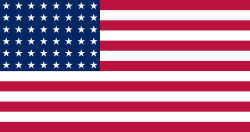USS Pennsylvania (BB-38)
 USS Pennsylvania (BB-38) v roce 1938 | |
| Základní údaje | |
|---|---|
| Typ | bitevní loď |
| Třída | Pennsylvania |
| Jméno podle | americký stát Pennsylvania |
| Objednána | 22. srpna 1912 |
| Zahájení stavby | 27. října 1913 |
| Spuštěna na vodu | 16. března 1915 |
| Uvedena do služby | 12. června 1916 |
| Osud | potopena jako cílová loď jaderných bomb v roce 1948 |
| Poloha vraku | Tichý oceán |
| Cena | 15 000 000 $ |
| Takticko-technická data | |
| Výtlak | 29 626 t (standardní) 32 429 t (plný) |
| Délka | 185,4 m |
| Šířka | 29,6 m |
| Ponor | 8,8 m |
| Pohon | 12 × Babcock & Wilcox 34 000 koní |
| Rychlost | 21 uzlů (39 km/h) |
| Dosah | 7 552 nám. mil (13 986 km) při rychlosti 12 uzlů (22 km/h) |
| Posádka | 1 031 mužů 56 důstojníků 72 vojáků |
| Pancíř | boky: 340 mm paluba: 76 mm velitelská věž: 410 mm |
| Výzbroj | (po dokončení): 12 × 356 mm /4×3) 22 × 127 mm (22×1) 4 × 76 mm (4×1) 2 × torpédomet |
| Letadla | (po dokončení): 2 × hydroplán |

USS Pennsylvania (BB-38) byla bitevní loď námořnictva Spojených států amerických, vedoucí loď třídy Pennsylvania. Její jedinou sesterskou lodí byla USS Arizona (BB-39).
Do služby byla uvedena 12. června 1916 a účastnila se bojů v druhé světové válce.
Při útoku na Pearl Harbor byla v suchém doku poškozena zásahy několika pum. Po opravě bojovala u Attu, Gilberových ostrovů, Kwajaleinu, Eniwetoku, Saipanu, Guamu, Palau, v zálivu Leyte, v úžině Surigao a u Lingayenu. 12. srpna 1945 byla těžce poškozena leteckým torpédem.
Kariéru ukončila v rámci testů jaderných bomb, kdy byla potopena 10. února 1948 u Kwajaleinu.
Výzbroj
Hlavní výzbroj lodě tvořily 4 střelecké věže s děly, které měly ráži 356 mm a byly schopny dostřelit do vzdálenosti až 30 km. Sekundární výzbroj tvořilo 22 děl ráže 127 mm. Dále zde byly 4 kanóny ráže 76 mm a 2 torpédomety s torpédy o průměru 533 mm.
Galerie
- USS Downes (DD-375), USS Cassin (DD-372) a USS Pennsylvania (BB-38) v suchém doku No. 1 v přístavu v Pearl Harboru (7. prosince 1941)
- USS Pennsylvania (BB-38) v suchém doku (1944)
- americké válečné lodě (1945)
- Operace Crossroads (1946)
Odkazy
Reference
V tomto článku byl použit překlad textu z článku USS Pennsylvania (BB-38) na anglické Wikipedii.
Literatura
JACKSON, Robert. Encyklopedie válečných lodí. [s.l.]: NAŠE VOJSKO, 2015. 448 s. ISBN 978-80-206-1199-4.
Související články
Externí odkazy
 Obrázky, zvuky či videa k tématu USS Pennsylvania na Wikimedia Commons (anglicky)
Obrázky, zvuky či videa k tématu USS Pennsylvania na Wikimedia Commons (anglicky)
- USS Pennsylvania (BB-38) Pearl Harbor Casualties Archivováno 6. 2. 2018 na Wayback Machine.
- stránky Comprehensive Pennsylvania Archivováno 26. 9. 2011 na Wayback Machine.
- fotografie Navy Pennsylvania (BB-38) Archivováno 16. 4. 2003 na Wayback Machine.
- MaritimeQuest USS Pennsylvania BB-38 fotogalerie
- (anglicky) Drachinifel: When the Japanese came after a Pearl Harbor survivor again - USS Pennsylvania, August 12th 1945 na YouTube
Média použitá na této stránce
US Flag with 48 stars. In use for 47 years from July 4, 1912, to July 3, 1959.
The U.S. Navy battleship USS Pennsylvania (BB-38) leading USS Colorado (BB-45) and the cruisers USS Louisville (CA-28), USS Portland (CA-33), and USS Columbia (CL-56) into Lingayen Gulf, Philippines, in January 1945.
The U.S. Navy battleship USS Pennsylvania (BB-38) underway off New York City (USA) during the Naval Review before President Franklin D. Roosevelt, 31 May 1934. Pennsylvania was then serving as flagship of the Commander in Chief, U.S. Fleet, Admiral David F. Sellers, USN.
The "Baker" explosion, part of Operation Crossroads, a nuclear weapon test by the United States military at Bikini Atoll, Micronesia, on 25 July 1946. The wider, exterior cloud is actually just a condensation cloud caused by the Wilson chamber effect, and was very brief. There was no classic mushroom cloud rising to the stratosphere, but inside the condensation cloud the top of the water geyser formed a mushroom-like head called the cauliflower, which fell back into the lagoon (compare with this image, a photo taken slightly later, after the condensation cloud had cleared). The water released by the explosion was highly radioactive and contaminated many of the ships that were set up near it. Some were otherwise undamaged and sent to Hunter's Point in San Francisco, California, United States, for decontamination. Those which could not be decontaminated were sunk a number of miles off the coast of San Francisco.
The U.S. Navy battleship USS Pennsylvania (BB-38) drydocked in an Advanced Base Sectional Dock (ABSD) at the Pacific, circa 1944. Note the extensive anti-torpedo "blister" built into her hull side and paravane streaming chains running from her forefoot to her foredeck. She is painted in Camouflage Measure 21.
The wrecked destroyers USS Downes (DD-375) and USS Cassin (DD-372) in Dry Dock No. 1 at the Pearl Harbor Naval Shipyard, soon after the end of the Japanese air attack. Cassin has capsized against Downes. USS Pennsylvania (BB-38) is astern, occupying the rest of the drydock. The torpedo-damaged cruiser USS Helena (CL-50) is in the right distance, beyond the crane. Visible in the center distance is the capsized USS Oklahoma (BB-37), with USS Maryland (BB-46) alongside. The smoke is from the sunken and burning USS Arizona (BB-39), out of view behind Pennsylvania. USS California (BB-44) is partially visible at the extreme left.
en:USS Pennsylvania (BB-38) battleship (wrong image title).
Downloaded from [1]









